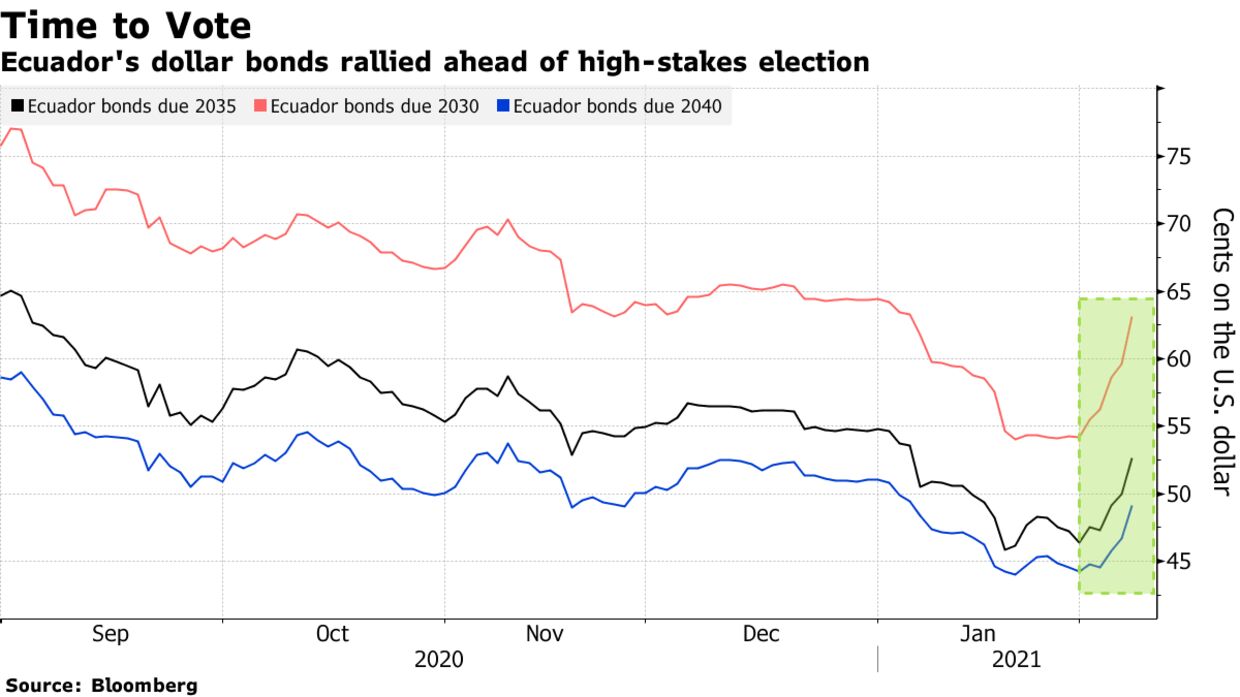Politics
Knife-Edge Election to Decide Whether Ecuador Stays a U.S. Ally
By- Socialist economist and millionaire banker are leading polls
- Ecaudor has patched up ties with Washington in recent years
Polls are open in Ecuador in an election that will decide whether the country turns its back on the U.S. and restores an alliance with socialist regimes in Cuba and Venezuela.
The result of Sunday’s voting has the potential to upend relations with Beijing or Washington, and could even jeopardize Ecuador’s continued use of the U.S. dollar.
Long lines formed at some polling stations in the capital Quito, as measures to reduce the risk of Covid-19 infection slowed the pace of voting.
Voters face a stark choice between embracing painful economic change or harking back to a prior era of fiscal largesse. There are 16 candidates, but polls suggest it’s a neck-and-neck race between Guillermo Lasso, a conservative banker and self-made millionaire and Andres Arauz, a socialist economist.

Guillermo Lasso
Photographer: Rodrigo Buendia/AFP/Getty Images
“What’s at stake is fiscal austerity versus a return to the debt cycle”, said John Polga-Hecimovich, who teaches political science at the U.S. Naval Academy in Annapolis, Maryland.
A victory for Arauz will trigger a sell-off in the nation’s dollar bonds, while win for Lasso will cause a rally, according to a report by Seaport Global Holdings LLC in New York.
Polls are open from 7am to 5pm, with preliminary results expected early Sunday evening. Pollsters are predicting the contest will go to an April 11 runoff.
Serial Defaulter
The campaign for control of Ecuador, an oil exporter and world-leading producer of bananas, shrimp, and the balsa wood crucial for wind-turbine rotors, has become a battleground of international interests.
The country is notorious among bond investors as a serial defaulter, and the election comes months after the country restructured more than $17 billion in debt last year.
Arauz, who was handpicked by former President Rafael Correa, has drawn support from leftist Cuba, Venezuela and Argentina. Lasso campaigned to boost investment and private sector hiring.
President Lenin Moreno, who was formerly Correa’s deputy, narrowly beat out Lasso in 2017. He then broke with his former ally, reinstating the term limits Correa had eliminated and patching up relations with the U.S. With approval ratings in the single digits amid economic malaise, he chose not to seek re-election.
With the country still reeling from the devastation wrought by the pandemic, Arauz has pledged to provide $1,000 to 1 million needy families. Lasso says he’ll boost the monthly minimum wage to $500, from $400.

The use of the U.S. dollar is another point of contention. Arauz plans to use central bank reserves to cover his campaign promises, which has sparked fears he will end up forced to introduce a new currency.
Read More: Why Ecuador’s Sunday Vote Matters for the Bond Market
Even after $7 billion in multilateral loans last year, Ecuador will need another $7.6 billion in new financing in 2021, according to an IMF report from December. This assumes the country will manage to slash the deficit to a target of $2.8 billion this year, from $7.2 billion in 2020.
Aruaz has also suggested raising the tax on taking currency out of the country to as high as 27%. Lasso has pledged to phase out the levy, which currently stands at 5%.
Emergency Loans
Arauz has recently toned down his rhetoric against the International Monetary Fund, which provided $4 billion in emergency loans to Ecuador in 2020, and his campaign also reached out to Wall Street investors to reassure them that his government would be fiscally responsible. Arauz’s campaign declined to comment.

Andres Arauz
Photographer: Rodrigo Buendia/AFP/Getty Images
Cedatos, a pollster, showed Arauz and Lasso with close to 22% support in the final poll before the vote. Yaku Perez, an environmentalist representing the indigenous party Pachakutik, had 14.5% backing. Other polls showed Arauz with a wide lead, though most indicated there would be a second round.
The 137 seats of Ecuador’s congress are also up for grabs Sunday. With the legislature likely to split between several parties, the next president is unlikely to command a majority, posing an obstacle to the government’s agenda no matter who wins.

Keine Kommentare:
Kommentar veröffentlichen